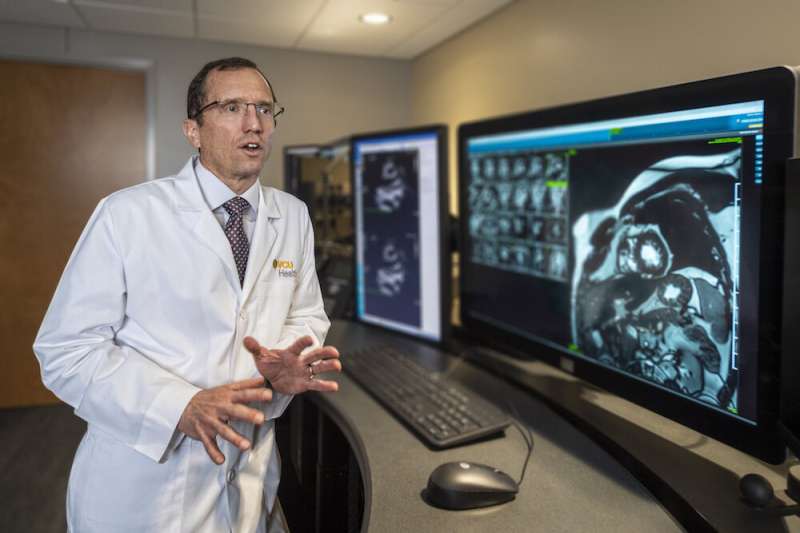Greg Hundley, M.D., discusses the emerging field of cardio-oncology. Credit: Allen Jones, University Marketing
Approximately every 40 seconds, an American will have a heart attack. The American Heart Association notes that heart disease remains the No. 1 cause of death in the United States.
What people do not often realize, said Greg Hundley, M.D., director of VCU Health Pauley Heart Center and a research member of VCU Massey Cancer Center's Cancer Prevention and Control program, is that heart disease affects a population of people already fighting another battle: cancer.
In fact, for many women with breast cancer, emerging data indicate they are more likely to die of cardiovascular disease than of breast cancer itself. For more than a decade, Hundley has been studying the effects of chemotherapy and radiation on heart health as a means to reduce heart failure in cancer patients and develop more personalized treatment options.
VCU News sat down with Hundley during American Heart Month to discuss this complex field of cardio-oncology.
What is cardio-oncology?
Cardio-oncology is the study of adverse heart and blood vessel diseases that occur in patients being treated for cancer. It's not so much about cancerous tumors in the heart, but about the relationship between cancer treatments and their effects on the heart.
What is the connection between cancer and heart health?
There are a number of connections when it comes to cancer and the heart.
Part of cardio-oncology is managing risk factors that occur for both illnesses so a patient doesn't experience an untoward adverse cardiac event. Risk factors are things that might make one predisposed to developing an illness—in this case, cancer or cardiovascular disease. Interestingly, many of the risk factors for cancer are also risk factors for cardiovascular disease. These include factors like obesity, prior or current smoking history, and family history of cardiac disease or high blood pressure. We work to determine if a cancer patient is at risk for developing heart problems and what we can do to minimize the risk of sustaining a cardiovascular event while he or she is undergoing treatment.
One must also consider the development of cardiovascular disease after starting cancer treatment. We use several strategies to treat cancer, which include intravenous infusions or disrupting blood supply to cancer cells. Those strategies can potentially hurt the heart. For instance, the heart is the most metabolically active organ that we have. It beats all the time, day and night. If cancer drugs are trying to disrupt the metabolism of the cancer cells as they are rapidly dividing, then a side effect could be damaged metabolism of the heart.
What is VCU Health doing in the area of cardio-oncology?
We're doing three things across three broad categories—clinically, in research and in education.
The first, clinically, is how we help patients. Oncologists, the doctors who treat cancer, work with cardiologists who take care of the heart, to see three types of patients in a special cardio-oncology clinic. They see patients: 1) at risk for developing cancer or heart problems early on, 2) who are receiving cancer treatment that could potentially cause—or has already caused—a heart problem, or 3) who have completed cancer treatment, but are still at risk for developing a heart problem.
The second category is research. Our discovery research often includes "translational science," where we try to prevent the injury of single heart cells after exposure to cancer treatment. This is called "translational" because once we discover strategies to prevent cell injury we "translate" that finding up to patients in a clinical study. VCU Health is unique because researchers also conduct studies with patients as participants—or clinical trials.
The third broad category is education. Education is very important. We are not only educating our patients about the impacts cancer treatments could have on their cardiovascular health, but as an academic medical center we are educating the next generation of student researchers and clinicians who will treat these illnesses in the future.
Is everyone who undergoes cancer treatment at risk for heart failure?
No, not everyone who undergoes cancer treatment is at risk for heart failure. There are a number of factors to consider when we assess someone's risk.
We look at the patient's risk factors [such as underlying conditions, high blood pressure, obesity and smoking] that might make them predisposed to heart disease. We also consider the type of cancer someone has, as well as how far that cancer has advanced.
All of these must be considered when trying to determine if someone will have cardiovascular issues during treatment and before personalizing a treatment option.
Provided by Virginia Commonwealth University




















